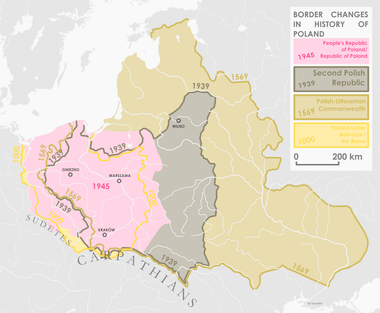Kresy Zachodnie
| Territorial evolution of Poland in the 20th century |
|---|
|
Post World War II |
|
Areas
|
|
Demarcation lines
|
|
Adjacent countries |

Kresy Zachodnie (Polish pronunciation: [ˈkrɛsɨ zaˈxɔdɲɛ], Western Borderlands) is a term used by Poles, mostly in a historical context, to refer to the western parts of the Polish-Lithuanian Commonwealth that in the partitions were annexed by Prussia. This name refers specifically to the regions of Eastern Pomerania (Pomerelia or West Prussia), Great Poland (province of Posen), Warmia (the German-speaking but Polish-royal bishopric of Ermland), and occasionally eastern Upper Silesia (Katowice).
This term, styled after Kresy Wschodnie (Eastern Borderlands), was first used by Jan Chryzostom Zachariasiewicz in his novel Na kresach published in 1860, but it did not enter common usage.
The 19th century history of these regions was quite different from the rest of the former Commonwealth. There were uprisings in 1806, 1846, and 1848 but the main battle between the Polish majority and large German minority was for economic domination in these provinces.
After World War I, most of this area became part of the Second Polish Republic as a result of the Greater Poland and Silesian Uprisings and decisions by the victorious Allies.
During the interwar period interbellum most inhabitants of this area supported the politics of Narodowa Demokracja political movement. Polish leader Józef Piłsudski was treated with considerable reserve or with open enmity. This was due to his collaboration with the Central Powers in World War I (having been a minister of the Regency Kingdom of Poland and leader of the Polnische Wehrmacht), and a perception that during the years when an independent Poland was being created Piłsudski was more interested in fighting for the eastern Kresy Wschodnie to become part of the new state than in fighting for the western Kresy Zachodnie. This despite the fact that the 1919-1939 western Kresy had a higher percentage of ethnic Poles than the eastern Kresy.
After 1945, the name Kresy Zachodnie was also used for the so-called "Recovered Territories" (now known as the "Western and Northern Territories") (see historical eastern Germany), which were resettled in large part by Poles from Kresy Wschodnie after having been ethnically cleansed of Germans.
See also
- Former eastern territories of Germany
- Greater Poland Uprising (1918–1919)
- Kulturkampf
- German Eastern Marches Society (Hakata)
- Settlement Commission
- Western Institute